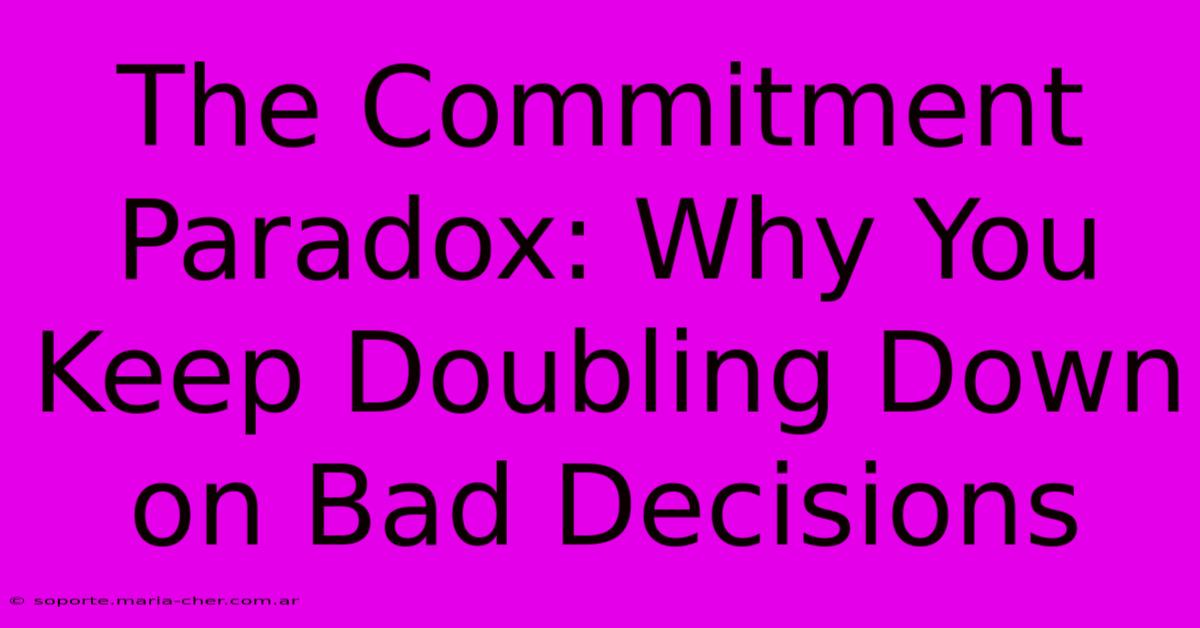The Commitment Paradox: Why You Keep Doubling Down On Bad Decisions

Table of Contents
The Commitment Paradox: Why You Keep Doubling Down on Bad Decisions
We've all been there. You've invested time, money, or effort into something that clearly isn't working. Logic screams at you to cut your losses and move on. Yet, instead of abandoning ship, you find yourself doubling down, throwing even more resources into the failing venture. This baffling behavior is known as the commitment paradox, and understanding it is crucial to making better decisions in life.
Understanding the Commitment Paradox
The commitment paradox stems from a cognitive bias known as escalation of commitment. This isn't simply stubbornness; it's a complex psychological phenomenon driven by several factors:
1. The Sunk Cost Fallacy:
This is the most prominent culprit. The sunk cost fallacy refers to our tendency to continue investing in something because we've already invested so much, even if the future prospects are bleak. We feel the need to "get our money's worth," even if that means throwing good money after bad. Whether it's a failing business, a strained relationship, or a project gone awry, the initial investment becomes a justification for continued commitment.
2. Justification of Past Decisions:
Our brains are wired to seek consistency. Once we've made a decision, we tend to rationalize it, even in the face of contradictory evidence. Admitting we made a mistake is difficult, so we justify our actions, often leading to further investment in a losing proposition. This self-justification reinforces the commitment, making it harder to abandon the failing endeavor.
3. Fear of Loss Aversion:
Loss aversion is a powerful psychological principle suggesting we feel the pain of a loss more acutely than the pleasure of an equivalent gain. The prospect of losing what we've already invested is often more daunting than the potential benefits of starting fresh. This fear fuels the escalation of commitment, pushing us to cling to the failing venture rather than face the potential loss.
4. Ego and Self-Image:
Often, our commitment to a particular path is intertwined with our self-image. Giving up can feel like admitting failure, a blow to our ego and self-worth. This fear of perceived failure can override rational judgment, leading to continued investment despite negative outcomes.
Breaking Free from the Commitment Paradox
Recognizing the commitment paradox is the first step towards overcoming it. Here are some strategies to help you avoid this trap:
1. Separate Emotion from Logic:
When evaluating a situation, try to separate your emotions from the facts. Objectively assess the current state of affairs, disregarding past investments. Ask yourself: "If I were starting this project today, knowing what I know now, would I still invest?"
2. Set Clear Exit Strategies:
Before embarking on any significant endeavor, establish clear criteria for when to cut your losses. This pre-emptive planning removes the emotional burden of making difficult decisions under pressure. Having predefined milestones and targets makes it easier to objectively evaluate progress and make informed decisions.
3. Seek External Perspectives:
It’s easy to get caught up in our own biases. Seeking advice from trusted friends, colleagues, or mentors can provide valuable external perspectives, helping to challenge our assumptions and identify blind spots. An objective opinion can significantly impact decision-making.
4. Practice Mindfulness and Self-Awareness:
Cultivate mindfulness to become more aware of your own thought processes and biases. Recognize the signs of the commitment paradox—the justifications, the emotional attachment, and the fear of loss—before they lead to further detrimental investment.
Conclusion: The Power of Discernment
The commitment paradox is a powerful force, subtly influencing our decision-making process. By understanding its underlying mechanisms and employing the strategies outlined above, we can break free from its grip and make more rational, effective decisions in both our personal and professional lives. Learning to discern when to persevere and when to gracefully retreat is a crucial skill for navigating the complexities of life. The ability to cut your losses and move forward is a sign of strength, not weakness.

Thank you for visiting our website wich cover about The Commitment Paradox: Why You Keep Doubling Down On Bad Decisions. We hope the information provided has been useful to you. Feel free to contact us if you have any questions or need further assistance. See you next time and dont miss to bookmark.
Featured Posts
-
Unleash Your Inner Nail Artist Discover The Dazzling Effects Of A Dnd Nail Lamp
Feb 06, 2025
-
Unlock The Power Of Peer Pressure The Astonishing Science Behind Social Facilitation
Feb 06, 2025
-
Leeds United Coventry City Match Result
Feb 06, 2025
-
Censori Grammy Stripping Regret
Feb 06, 2025
-
Elevate Your Vba Skills Variables As Dynamic Form Components
Feb 06, 2025
